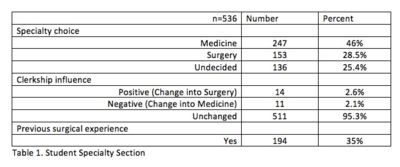C2A - 07: THIRD-YEAR SURGICAL CLERKSHIP HAS MINIMAL INFLUENCE ON MEDICAL STUDENT SPECIALTY SELECTION
Alessandra Landmann, MD, John P Perkins, BS, Jason S Lees, MD, Arpit Patel, Md; University of Oklahoma Health Sciences Center

Introduction: Concerns regarding decreasing interest in general surgery have been well published. Among many potential impacts, most concerning is the potential shortage of surgical specialists in the United States. This observational study attempts to assess medical-student specialty choices and the influence of the surgical clerkship.
Methods: From 2013-2017, third-year medical students completed an anonymous survey at the beginning and at the end of their 8-week clerkship. Evaluations were coded and paired. Among many other survey questions, they were asked to select a specialty choice from a list of available options.
Results: Paired responses were obtained from 536 students over the study period. Data was collected regarding their previous surgical experience and expectations of the rotation. They were asked to select a specialty choice (Table 1). 46% of students reported interest in medical subspecialties, including internal medicine, family medicine and psychiatry. 28.5% of students reported an interest in surgical specialties and 25.4% were undecided. When comparing responses, few students changed specialty choice at the end of the clerkship, with 95.3% selecting the same specialty after spending eight weeks on the surgery rotation.
Conclusions: Selecting a specialty is a complex decision process for medical students. Our data suggests that the majority of students have already chosen a specialty prior to the third-year clerkships. With 25% of students being undecided, the potential exists to recruit interested students into surgical residency with appropriate mentorship and exposure.
